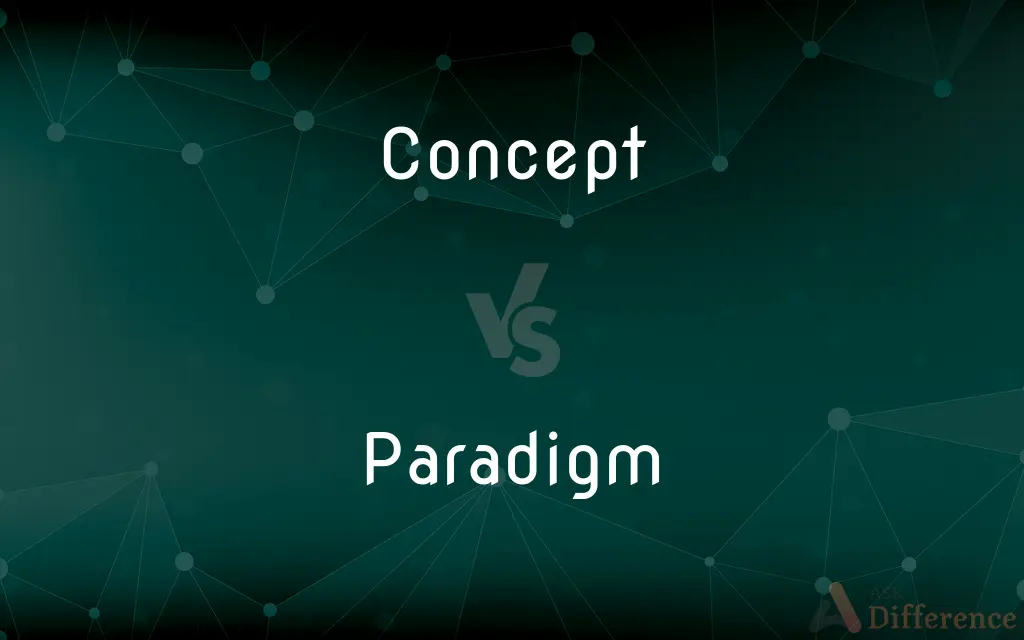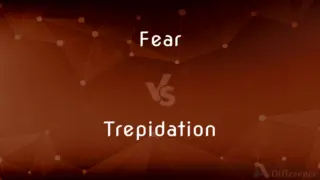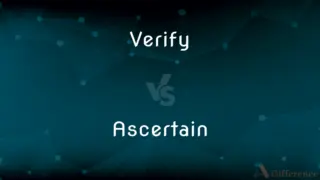Concept vs. Paradigm — What's the Difference?

Difference Between Concept and Paradigm
ADVERTISEMENT
Compare with Definitions
Concept
Concepts are defined as abstract ideas or general notions that occur in the mind, in speech, or in thought. They are understood to be the fundamental building blocks of thoughts and beliefs.
Paradigm
In science and philosophy, a paradigm () is a distinct set of concepts or thought patterns, including theories, research methods, postulates, and standards for what constitutes legitimate contributions to a field.
Concept
An abstract idea
Structuralism is a difficult concept
The concept of justice
Paradigm
A typical example or pattern of something; a pattern or model
Society's paradigm of the ‘ideal woman’
Concept
A general idea or understanding of something
The concept of inertia.
The concept of free will.
ADVERTISEMENT
Paradigm
A set of linguistic items that form mutually exclusive choices in particular syntactic roles
English determiners form a paradigm: we can say ‘a book’ or ‘his book’ but not ‘a his book’
Concept
A plan or original idea
The original concept was for a building with 12 floors.
Paradigm
(in the traditional grammar of Latin, Greek, and other inflected languages) a table of all the inflected forms of a particular verb, noun, or adjective, serving as a model for other words of the same conjugation or declension.
Concept
A unifying idea or theme, especially for a product or service
A new restaurant concept.
Paradigm
One that serves as a pattern or model.
Concept
Having an experimental or strikingly different design, especially to test or demonstrate new features
A concept car.
Paradigm
A set or list of all the inflectional forms of a word or of one of its grammatical categories
The paradigm of an irregular verb.
Concept
An abstract and general idea; an abstraction.
Paradigm
A set of assumptions, concepts, values, and practices that constitutes a way of viewing reality for the community that shares them, especially in an intellectual discipline.
Concept
Understanding retained in the mind, from experience, reasoning and imagination; a generalization (generic, basic form), or abstraction (mental impression), of a particular set of instances or occurrences (specific, though different, recorded manifestations of the concept).
Paradigm
A pattern, a way of doing something, especially a pattern of thought, a system of beliefs, a conceptual framework.
Thomas Kuhn's landmark “The Structure of Scientific Revolutions” got people talking about paradigm shifts, to the point the word itself now suggests an incomplete or biased perspective.
Concept
(generic programming) A description of supported operations on a type, including their syntax and semantics.
Paradigm
An example serving as the model for such a pattern.
Concept
To conceive; to dream up
Paradigm
(linguistics) A set of all forms which contain a common element, especially the set of all inflectional forms of a word or a particular grammatical category.
The paradigm of "to sing" is "sing, sang, sung". The verb "to ring" follows the same paradigm.
Concept
An abstract general conception; a notion; a universal.
The words conception, concept, notion, should be limited to the thought of what can not be represented in the imagination; as, the thought suggested by a general term.
Paradigm
An example; a model; a pattern.
Concept
An abstract or general idea inferred or derived from specific instances
Paradigm
An example of a conjugation or declension, showing a word in all its different forms of inflection.
Paradigm
An illustration, as by a parable or fable.
Paradigm
A theory providing a unifying explanation for a set of phenomena in some field, which serves to suggest methods to test the theory and develop a fuller understanding of the topic, and which is considered useful until it is be replaced by a newer theory providing more accurate explanations or explanations for a wider range of phenomena.
Paradigm
Systematic arrangement of all the inflected forms of a word
Paradigm
A standard or typical example;
He is the prototype of good breeding
He provided America with an image of the good father
Paradigm
The class of all items that can be substituted into the same position (or slot) in a grammatical sentence (are in paradigmatic relation with one another)
Paradigm
The generally accepted perspective of a particular discipline at a given time;
He framed the problem within the psychoanalytic paradigm
Share Your Discovery

Previous Comparison
Fear vs. Trepidation
Next Comparison
Verify vs. Ascertain














































